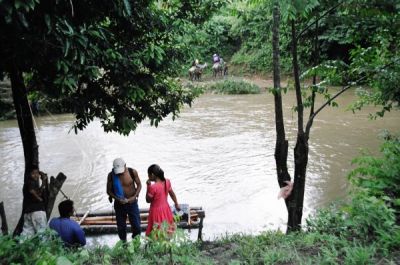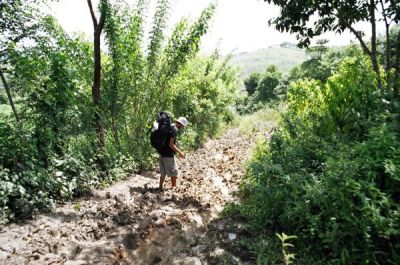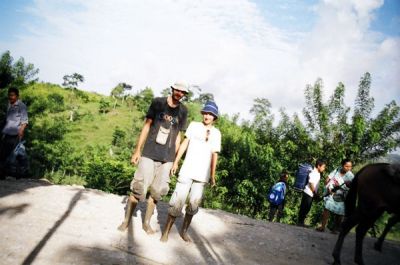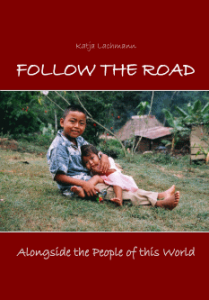Crossing an unofficial border from Belize to Guatemala (August 27)
September 11, 2006
Topics: Belize
All foreigners leaving Belize country are obliged to pay $18 US exit fee, which we wanted to avoid. We found out about an unofficial border crossing in Jalacte village in the South of Belize. From Jalacte it is still half an hour walk through muddy landscape. This we thought to manage despite the fact that I (Katja) cannot carry the backpack on my shoulders but instead have to use a carriage for transporting it.
Our permission to stay in the country expired one day before we headed towards Jalacte. We started in the nearby village Pueblo Viejo. When we finally got a ride, we were brought as far as 1,5 miles to the bridge flooded by the river (caused by recent heavy rains), which was impossible to cross by car. We had to walk barefoot through its thigh-high strong floods. Three more men crossing the stream were helping us with our belongings. While crossing the fast running water we had to hold each others hands. Quite wet afterwards, we went onto a hilly two hours walk towards Jalacte, which cost us a lot of strength.
The journey to Guatemalan side includes crossing of the river and 30 minutes hiking through muddy corn fields. We arrived to Jalacte by foot and turned to beginning of the knee-deep muddy horse trail towards the river. Hesitating, we asked some horse riders waiting for customers about the transfer price to Santa Cruz village in Guatemala, which was 10 Belizean Dollars ($5 US). We thought it was unfair price, as just for crossing river by boat locals pay 5 Guatemalan Quetzals ($0.80 US). Negotiations about the price were impossible. Thus, we crossed the muddy path to the river by ourselves. Augustas was walking the trail twice, for bringing all our belongings down to the river. I faced difficulties in finding hold in the mud. I partly sank knee-high into it, sometimes almost falling completely inside.
The horse riders made jokes about us, and passed by for telling the boat transfer responsible about our refusal of their service. When we arrived, everybody had a vague smile on his face. We knew the price, but the boat-man was asking $5 BZ ($2,50 US). We tried to negotiate, but there was no way. We decided to wait. We tried further negotiations, but without success. We got an idea to cross the river by ourselves. I went to check the possibilities up the stream, hiking along a small bushy path. Unfortunately, the strong stream forbid us to cross alone. When coming back we finally negotiated a price of $3 BZ ($1,50 US) each for the boat transfer. I got onto the boat, which was rather a raft consisting of 4 trunks, in a whole 1,20 meter long and 1 meter wide. On top of the raft two Pepsi plastic boxes were fixed, serving as a seat. The raft was transferred by hand, bound along a rope fixed on trees on both river sides. Having no Belizean, nor Guatemalan money, we paid in US dollars. The raft crew got confused, giving us back a higher change in Belizean dollars than we were supposed to receive.
Stumbling upstairs along a small corn field path, passing a fence, and walking two minutes on a stony road, we saw the further road going steep up and down, being made of unorderdly placed stones and a lot of mud. There was a second trail. It was muddy with unclear end. Finally, we had to consider the horse riders, who showed up laughing, but realizing that without them we had no chance to reach Santa Cruz village. The only money we still had was couple of Belizean dollars, which we got as a change from the raft-men. The horse-riders agreed to bring our backpacks across, claiming they are doing for us a big favour.
Two horse riders took each of our backpacks on their backs, riding through the worst trail I had ever seen in my life. Although I saw people on the next hill walking a smooth, slightly muddy path along the corn fields towards the Belizean Border, the horse riders directed us along this difficult horse trail. Though sceptical we followed them. Augustas carried our daypack and my carriage. He was always walking in front. The path was difficult to take for both of us, but again for my size it was terrible. Until half way through the horse trail I wore my sandals, for not sliding in between the stones. Later in the thigh-high mud I took them off, as I rather got stuck with them. I arrived far after Augustas, being watched by all the horse riders, who were amused about my fight against the mud. We were happy being through, soon washing all mud from us and our trousers.
In Santa Cruz we changed few US dollars, bought food, and soon left towards the exit of this weird town full of alcoholics, cowboys, and fancy styled females of every age. Being used to greet, people often simply ignored us. Mostly, we were looked at without any respect. Happily, we came across a couple of nice people when we were already far from Santa Cruz’ center. The following weeks in Guatemala changed our first impression, as we came across of dozens of friendly and open-minded Guatemalans.







You wanted to avoid paying the US$18 exit fee? So you spent an entire day dragging your backpacks around, walking in the heat for several hours, crossing rivers on foot and by boat, and negotiating with people all along the journey. And you saved what, US$10? Seems like a lot of effort for nothing – I admit, it’s quite an adventure, but it seems to me that the savings you made weren’t worth all that effort. And you still entered illegally, which could’ve got you into problems in the future.
I also disagree with your constant attempts to bargain the locals down to the local price – I agree, if something costs 1 dollar for a local, it should cost 1 dollar for a foreigner. And it’s good to have principles and stick to them. But you need to understand that you’re in the developing world, and you’re rich compared to them (no matter how poor you are at home, you’re still richer than 90% of the locals). If you can afford to travel the world, you can afford to pay whatever the locals ask (especially if it’s only a dollar or 2 more than the locals); and if you’re going to travel in poor countries you have to understand that there will always be a 2-tier pricing system, and sometimes it’s better to just accept it. Arguing over an amount of money which you’d spend at home in a second (and arguing with someone who’s many times poorer than you) makes you look really cheap.
And as far as the Belizean exit fee goes, while it’s true that there’s plenty of corruption in Belize (so some of the money doesn’t get to the intended recipients), it’s also true that the money brings much needed currency into the country, in this case by helping to support the protected areas and beautiful environment of Belize (which I assume you enjoyed while you were there).